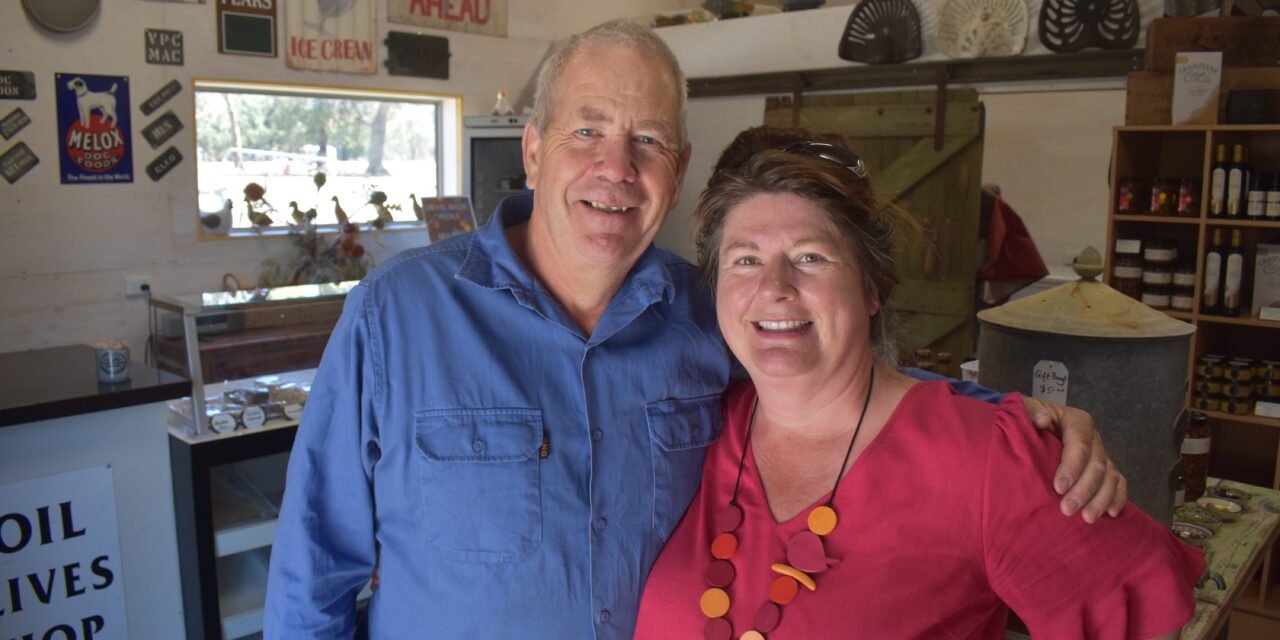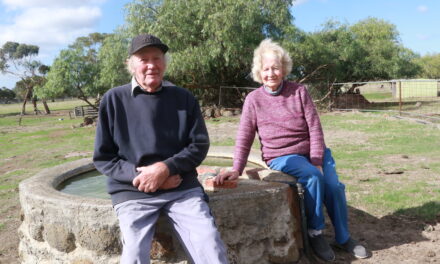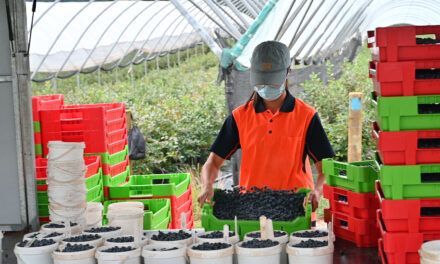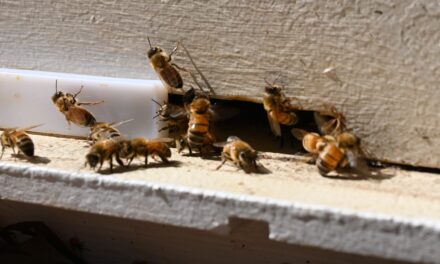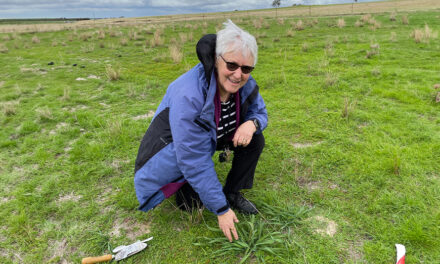When it comes to making jam, Anita Evans has the science perfected. RICK BAYNE tells her story.
Anita Evans has a degree in biology and biotechnology, and had a chance to study for a PhD, but instead found herself researching the science of making jam in a new country.
Today she and partner Andy Cross are enjoying the good life on their “tiny farm” at Pomonal near Halls Gap in the Grampians after moving from the United Kingdom in 2004.
Before moving, Anita worked as a cell biologist scientist for 11 years for Unilever and later in science product sales for seven years, while Andy was a fully qualified carpenter.
The couple visited Australia on holiday in 2001, including travelling through the Grampians region in Victoria.
“As soon as I got off the plane in Perth, I knew this was where I wanted to be,” Anita said. “It felt like home.”
After a long three-year migration process, they settled in Geelong — based on Anita’s research into growing cities that could use Andy’s carpentry skills and potential science jobs for her.
However, neither Anita nor Andy could find work in their chosen fields and instead started a dog grooming business.
“We saw others doing it for franchises so decided to learn how to do it and set up business on our own,” Anita said.
Although they had to overcome legal threats from franchise owners, Anita and Andy set up a good business but found they didn’t like city living, so in 2007, they sold their business and started exploring places in western Victoria to do the Aussie dream — get a block of land and build a house.
They found the ideal spot in Moyston, with views of the Grampians. They didn’t think dog grooming would work locally so Anita took various jobs as the secretary for a Catholic priest and later in employment services and homeless support for men leaving Ararat prison.
After building the house, Andy retrained as a prison officer.
However, they wanted to do something constructive together that made them both happy.
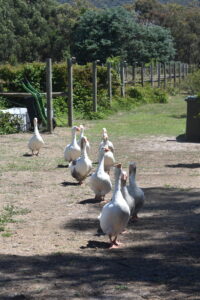
Five Ducks Farm.
When the Pomonal Berry Farm came on the market in 2016 they seized the opportunity.
“We fell in love with it instantly,” Anita said.
The berry farm was established in 2000 with the owners growing strawberries, raspberries and bramble berries for a retirement income.
In 2006, fires swept through the Grampians, taking out the front paddocks and all the strawberries and raspberries.
“It set them back,” Anita said. “They planted some fruit trees instead of berries and sold berry ice-creams and few jams at the local market.”
The former owners had sold their products from an old tiny demountable building which has since been converted by Andy and Anita into their commercial kitchen, with Andy turning the garage into a new retail space, and the farm gate shop was born.
For the first year at Five Ducks Farm, Andy continued to work at the prison and Anita for an employment agency while making jam part-time.
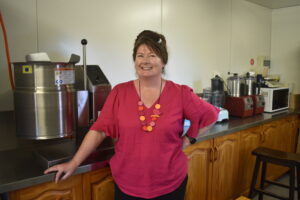
A new water-jacketed boiler and three-phase generator have revolutionised Anita Evans jam-making.
She had never maintained a fruit orchard or made jam before — but learning wasn’t difficult.
“It was just science — I researched what we needed to do, and then used my marketing and sales experience to sell it.
“My previous careers finally came in useful!”
She also completed a permaculture course which gave her a more holistic approach to growing produce and the importance of nutrient recycling within a system.
In the first year, Anita made as much money in jam as she did in her job so gave up the job to concentrate on the jam-making.
The next year she replaced her income and made a bit extra and it continued to grow and became a full-time job.
“There’s an old saying `money from jam’ and it has been really good for us,” Anita said.
The 9ha property needed some upgrading.
During the first few years, they put the neglected berries back into rows and planted new varieties such as tayberries and golden raspberries into raised beds to help conserve moisture in the poor hydrophobic sandy soil.
They planted a wide range of old cultivar fruit trees with plans for the future for some unusual preserves.
“We’re on poor sandy soil that was dramatically affected by the fires; the soil biology was killed off and the land is still healing,” Anita said.
Only one hectare of the land is under production with 24 40-metre rows of mixed bramble berries, along with fruit tree varieties, including a row of heritage cooking apples
“We are known for our variety, not for our volume,” Anita admits.
“Diversity is one of the big things they promote in permaculture. It’s better to have as much cover on the ground as possible to help keep moisture in and provide carbon and other essential nutrients in the soil. We don’t spray herbicides or pesticides.”
At any time they like to hold about 30 different preserves, calling on nearby Pomonal orchard and other local growers to supplement what is grown onsite, producing seasonal preserves that come and go.
“We’d outgrown our production by year three so we have to buy in fruit from other spray-free farms and play swapsies with the locals,” Anita said.
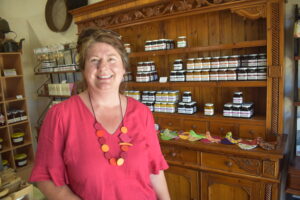
Anita likes to have 30 varieties of preserves on hand at any one time.
They don’t follow any set routine in land management, but like all farmers, are mostly guided by the weather and seasons.
They prune the berries in winter and add home-made compost to the soil, including recycling waste from a local supermarket in Ararat. This supply would end up in landfill but instead, they feed it to the chickens, ducks, pigs and sheep — the rest is composted and all the packaging is recycled.
“The cycling of nutrients is really important to us,” Anita said.
“That’s why we have animals. We feed the soil and the soil feeds the plants. Last spring was wet and our biggest yield ever. We know that keeping moisture in the soil is the critical thing.”
They have a bore for irrigation but it is limited by the shallow spring water availability.
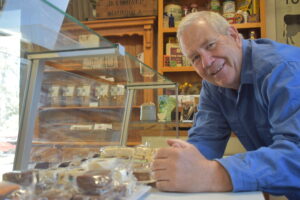
Andy Cross is responsible for making the fudge varieties.
Anita and Andy do the work themselves, including fruit picking.
“We don’t want to employ people,” she said.
“Our brand is us. We have hand-made by Anita on every jam jar. I don’t want someone else making jam for me.”
Andy makes the fudge and does any construction work that’s needed and attends local markets, while Anita makes the jams (including her favourite marmalade), chutneys, curds and delicious egg custard-based ice-cream.
In summer 2020, they converted the old garage into a farm gate shop before being shut down by COVID, meaning they had to focus more on online sales while maintaining their wholesale relationships with general stores, cafes, wineries and bed and breakfasts in the Grampians region.
“Opening the farm gate shop, that was a real turning point for us as we welcomed more tourists to the area,” Anita added.
The recent purchase of a water-jacketed boiler and three-phase generator that makes twice as much jam in half the time, is handy because Anita makes about 10,000 to 12,000 jars a year.
“That’s why we’re only open three days a week to the public because I have to be in the kitchen on the other days.”
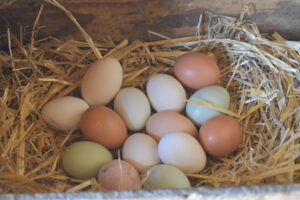
The farm’s duck and hen eggs are used to make curds and ice-cream.
The Five Ducks Farm name is a bit outdated. There are now about 45 ducks on the farm, along with a huge variety of chickens that produce rainbow eggs — brown, white, blue, green and cream eggs.
Duck eggs are used in the lemon and passionfruit curd and ice-cream, while some excess chicken eggs are sold during winter and spring but all get consumed with ice-cream making in the summer months.
Wiltshire Horned Sheep are kept for their own meat consumption and make great lawnmowers in the front and back paddocks, and a couple of saddleback pigs help with disposing of excess green waste.
Anita and Andy plan to enclose the fruit tree area with fox-proof and bird-proof netting, allowing the chickens to roam through safely.
Andy, 62, and Anita, 55, are happy with their lot in life.
“I did a business development program run by the council and they wanted us to get bigger and export overseas but we don’t want the hassle of someone else’s expectations, running staff or chasing paperwork,” Anita said.
“As long as you have enough, you don’t need to do any more. We’ve changed from chasing business growth to enjoying and maintaining a happy lifestyle.”
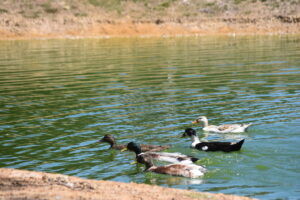
From five ducks to 45 and counting.
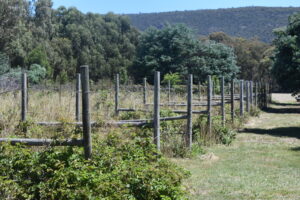
Rows of mixed bramble berries.
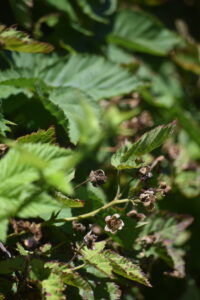
Berries growing on Five Ducks Farm.
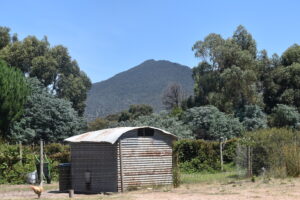
Five Ducks Farm.
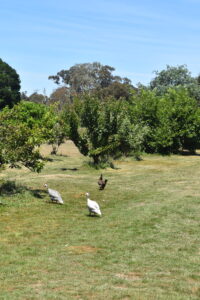
Anita and Andy plan to enclose the fruit tree area with fox-proof and bird-proof netting, allowing their poultry to roam through safely.

